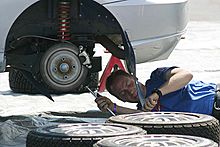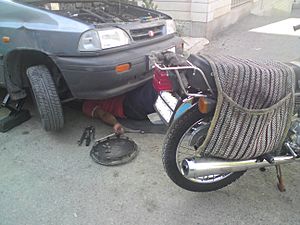Auto mechanic facts for kids

An auto mechanic working on a rally car.
|
|
| Occupation | |
|---|---|
| Names | Mechanic, technician, auto repairman |
|
Occupation type
|
Vocational |
|
Activity sectors
|
Automobile |
| Description | |
|
Education required
|
Apprenticeship, in addition to training once hired; some mechanics may take vocational or community college or university courses in certain areas such as heating and air conditioning, engine and transmission maintenance, and collision repair; further education and training could lead to becoming a supervisor or manager, or with a baccalaureate or graduate degree, an automotive engineer or design specialist. |
|
Related jobs
|
Motorcycle mechanic, Diesel mechanic |

An auto mechanic is a skilled person who fixes and maintains cars. They are also called automotive technicians or motor mechanics. Their main job is to figure out what's wrong with a car and fix it quickly. They might repair a small part or replace bigger parts. Mechanics often tell customers the cost before starting work. Regular car check-ups, called basic vehicle maintenance, are a big part of their job.
Contents
How Do Auto Mechanics Learn Their Skills?
People can learn to become auto mechanics in different ways. Some learn by working with experienced mechanics. Others go to special schools or colleges.
Apprenticeship Programs
An apprenticeship is like learning on the job. Apprentice mechanics work with experienced mechanics, called master technicians. They learn skills directly from them over several years. Master technicians often get extra pay for training apprentices.
Specialized Schools
Many schools in the United States offer training for future mechanics. These programs teach about car repair, maintenance, and even painting. You can also learn about car electronics and air conditioning systems. The National Automotive Technicians Education Foundation (NATEF) checks these training programs. They make sure the schools meet industry standards.
Skill Levels and Certifications
Car repair shops often have different skill levels for their mechanics. This helps them match the right mechanic to each repair job. A mechanic's skill level depends on their experience and special certifications.
ASE Certification
The National Institute for Automotive Service Excellence (ASE) is a group that tests and certifies mechanics. This helps car owners know a mechanic's skill level. To get ASE certified, mechanics must pass a test. They also need two years of work experience. Or, they can have one year of experience plus a two-year degree.
A mechanic becomes an ASE Master Technician by passing all the required tests. These certifications are good for five years. Mechanics must retest to keep their master status. While not always required by law, many shops prefer or only hire ASE-certified mechanics.
OEM Training
Car makers, known as Original Equipment Manufacturers (OEMs), often provide extra training. This training helps mechanics specialize in a certain car brand. For example, a mechanic might get special training for BMW or Toyota cars. Some schools offer these OEM training programs. This helps mechanics learn about specific car brands before working at a dealership. OEMs usually have different skill levels for their technicians, often including a "Master" level.
EPA Certification
The United States Environmental Protection Agency (EPA) requires special certification for mechanics. This is for anyone who fixes car air conditioning systems. Mechanics must be trained by an EPA-approved program. They also need to pass a test to show they understand the rules. This certification does not expire.
Different Types of Auto Mechanics
There are many kinds of auto mechanics, each with a special focus.
Auto Body Mechanics
An auto body technician fixes the outside of a car. This includes repairing scratches, dents, and paint damage. They also fix major damage from car accidents. Some can even fix dents without painting, replace glass, or straighten a car's frame.
Auto Glass Mechanics
An auto glass technician repairs or replaces car glass. This includes windshields, side windows, and rear glass. Damage often comes from hail, stones, or vandalism. They decide if the glass can be repaired or if it needs to be replaced.
Diesel Mechanics
A diesel mechanic works on diesel engines. These engines are often found in large trucks and heavy equipment.
Exhaust Specialists
An exhaust system specialist fixes a car's exhaust system. They use special tools to bend pipes and weld them together. This helps them create new exhaust systems.
Fleet Mechanics
A fleet mechanic takes care of a group of vehicles, called a fleet. Examples include taxi cabs, police cars, or rental cars. They focus on regular maintenance and safety checks. For bigger repairs, they might send the vehicles to another shop.
General Repair Mechanics
A general repair technician diagnoses and fixes many car systems. This includes brakes, engines, air conditioning, and electrical systems. Some general mechanics specialize in a few systems. Master technicians, however, can work on almost all car systems.
Heavy Line Mechanics
A heavy line mechanic does major car repairs. This includes replacing entire engines or transmissions. Some can even take these big parts apart and rebuild them.
Lubrication Technicians
A lubrication technician, or lube tech, is an entry-level job. They focus on basic preventive maintenance. Their tasks include changing car fluids, filters, belts, and hoses. Lube techs are common in quick service shops.
Mobile Mechanics
A mobile technician does many of the same repairs as a general mechanic. The difference is they travel to the customer's location. This means they don't work inside a traditional car repair shop.
Pit Crew Mechanics
A pit crew mechanic works on a racecar during a pit stop. They perform quick tasks like changing tires, filling gas, or cleaning the windshield. They must be extremely fast and accurate.
Challenges for Auto Mechanics
Physical Demands
Being an auto mechanic is physically demanding. They often work in extreme temperatures. They lift heavy objects and stay in uncomfortable positions. They might also be around chemicals.
Technological Changes
Cars today have complex computer and electronic systems. Mechanics need to keep learning about new technologies. Their job now involves much more than just mechanical repairs.
Tools and Equipment
Mechanics need many tools and special equipment. While employers often provide big equipment, mechanics usually buy their own hand tools.
Resources for Mechanics
Scan Tools
Modern cars have complex computer systems. Most repair shops give mechanics special diagnostic computers. These tools help them find and fix problems in cars.
Online Information
Mechanics often use the internet to find information. They can access technical manuals and repair guides online. This makes it easier to diagnose and fix vehicles.
Online Scheduling
Many customers now schedule car repairs online. For mobile mechanics, an online appointment means they travel to the customer.
Related Careers
A mechanic can also choose other jobs related to cars.
Some mechanics become teachers for automotive trade courses. They share their skills with new students.
Other jobs include panel beater (fixing car body damage) or spray painter (painting cars). There are also motorcycle mechanics. These are often separate training paths. However, a skilled mechanic can often learn these new trades.
Auto body repair involves less grease but can expose workers to dust and paint fumes. Some mechanics use their car knowledge to become successful salespeople or dealers. Mechanics must always learn about new car models and technologies.
See also
- Exhaust gas analyzer
- Service (motor vehicle)
- Jerry Truglia, automotive instructor and author


